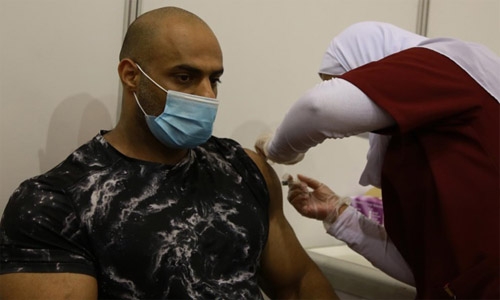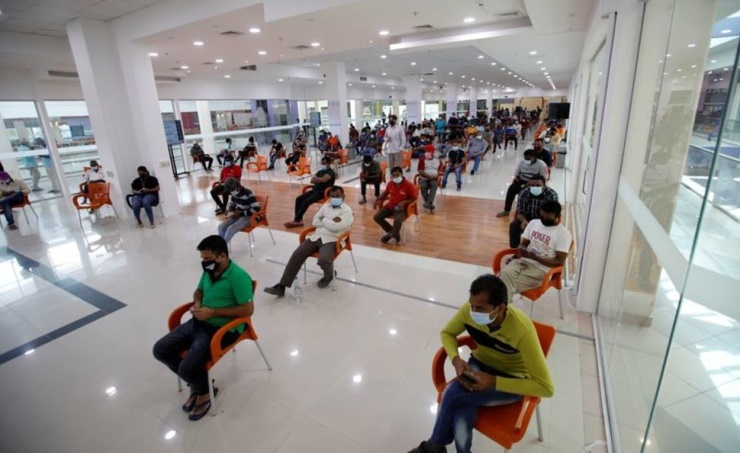Bahrain emerges stronger in uncertain world
TDT | Manama
The Daily Tribune – www.newsofbahrain.com
The onslaught of COVID-19 is unparalleled in modern history with dramatic figures of 125 million people contracting the virus and 2.750 million people losing their lives in one year.
Countries worldwide sought to contain the pandemic, mitigate the spread of the virus and offer resources to people, institutions and companies to keep moving, be it at a slower pace at time, and ensure a minimum of normalcy.
Bahrain, in line with its consistent and principled policy of a responsible state at all times, promptly set up a taskforce led by His Royal Highness Prince Salman bin Hamad Al Khalifa, the Crown Prince and Prime Minister, and made up of experts to confront the coronavirus, limit its health, economic and social effects and ensure people's rights are not affected by emergency responses.
Building on its expertise, reliance on scientific facts and knowledge of the communities and learning from the experiences of other countries in past virus battles, the taskforce never lost its focus that people should always remain the core of all precautionary measures, regardless of how deep the global crisis is.
A massive repatriation of the Bahrainis stranded abroad or wishing to come home was launched as logistics were prepared to welcome them back amid safety and precautionary measures to ensure the wellbeing of the nation.
The economic stimulus package announced in March 2020 ensured that businesses did not have to shut down and people could continue to work.
Designed to mitigate the impact of COVID-19 on households and enterprises, it secured the jobs and salaries of more than 90,000 Bahrainis and supported over 11,000 private sector employers.
The package provided businesses and individuals with much needed support through paying the water and electricity costs and exempting the municipal fees for more than 380,000 subscribed accounts.
Rent on government-owned industrial lands was waived for over 730 businesses, and over 280 further businesses have been exempted from payment of tourism fees.
The package to ensure people's right to work was equivalent to 32.2% of Bahrain's GDP.
Modern technology was leveraged to provide health and other services and help public and private entities implement remote work policies. Mothers were given the right to work from home and to offer comfort and support to their children during the pandemic.
Out of its keenness to ensure people's right to health, and as early as August, Bahrain made an order to purchase more than 1 million doses of the COVID-19 vaccines being developed by BioNTech and Pfizer, British firm AstraZeneca and the Chinese Sinopharm.
In late February 2020, schools were shut down as a precaution, yet at the same time, students were not deprived of their right to learn thanks to the several platforms set up to continue teaching and learning online. Education was never suspended and students have been able to "attend" their classes, learn their lessons, sit down for their regular exams and graduate in extraordinary ceremonies. The right of students to education was never at risk.
Under COVID-19, family bonds had to undergo changes since direct contacts with distant relatives were not encouraged. Yet, people were urged to uphold the deep-rooted family and social traditions by staying in contact with their loved ones through applications that allowed instant audio and visual communication.
The freedom of movement was never restricted, as Bahrain was one of the few countries that did not impose a lockdown or a curfew even during the most challenging times.
The freedom of speech was never at risk and people could continue to speak or write their opinions as usual. The government was keen on fighting all kinds of misinformation and disinformation to ensure the rights of people to the correct information and exact details and thus avoid the "infodemic" that caused huge problems in several communities across the world.
The health measures, including medical tests, medicine, treatment and subsequently vaccinations, have been available to all people, regardless of their nationality, age, race and religion.
In a country where foreigners make up slightly more than half of the total population and where people from almost two hundred nationalities co-exist, not a single health service has been narrowed and there has not been a single case of social, economic, racial or religious inequality.
The COVID-19 circumstances are unprecedented in Bahrain and across the world. However, Bahrain's commitment to protecting human rights in all weathers and through all challenges and crises has not wavered. Bahrain converted a massive multistory car park into a 130-bed intensive care unit for patients with COVID-19 care unit with each bed equipped with a ventilator. It also transformed a shopping mall into a giant COVID-19 vaccination hub.
This is a country where citizens and foreign residents can choose free of charge from four vaccines for their vaccination, at a time when under other skies, the inoculation has not started yet or immunization is wading into controversies. This is a country where inmates, supposed the most vulnerable component of the community, are vaccinated with the vaccine of their choice after health workers explain to them the differences between them.
During the pandemic, the rights of young people facing justice issues were reinforced by the promulgation the corrective justice law to better meet the children’s needs to be re-integrated into the community through the creation of a supportive environment. Amid the tsunami of misinformation and disinformation and the perturbing potency of conspiracy theories by a stream and social media vis-à-vis COVID-19, the trust between the people and the Bahraini media was phenomenal and the best vaccine against viral communication abuses.
It is given to few, very few countries to strike the perfect balance between ensuring the health and wellbeing of all people, providing them with regular services, enabling them to carry on with their lives and livelihoods and protecting their human rights. Bahrain is one of this select group of countries.
Related Posts


